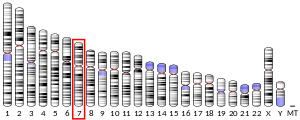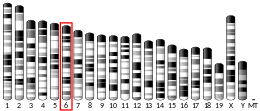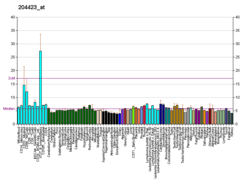Muskelin
Muskelin is a protein that in humans is encoded by the MKLN1 gene.[5][6]
Interactions
MKLN1 has been shown to interact with RANBP9.[7]
gollark: Maybe.
gollark: Power eggs... aeons?
gollark: > saw kyanite pygmy in AP> thought about getting it> decided to> it's gone
gollark: *banned*
gollark: They should just remove sickness already.
References
- GRCh38: Ensembl release 89: ENSG00000128585 - Ensembl, May 2017
- GRCm38: Ensembl release 89: ENSMUSG00000025609 - Ensembl, May 2017
- "Human PubMed Reference:". National Center for Biotechnology Information, U.S. National Library of Medicine.
- "Mouse PubMed Reference:". National Center for Biotechnology Information, U.S. National Library of Medicine.
- Adams JC, Zhang L (May 2000). "cDNA cloning of human muskelin and localisation of the muskelin (MKLN1) gene to human chromosome 7q32 and mouse chromosome 6 B1/B2 by physical mapping and FISH". Cytogenet Cell Genet. 87 (1–2): 19–21. doi:10.1159/000015385. PMID 10640805.
- "Entrez Gene: MKLN1 muskelin 1, intracellular mediator containing kelch motifs".
- Umeda, M; Nishitani H; Nishimoto T (Jan 2003). "A novel nuclear protein, Twa1, and Muskelin comprise a complex with RanBPM". Gene. Netherlands. 303: 47–54. doi:10.1016/S0378-1119(02)01153-8. ISSN 0378-1119. PMID 12559565.
Further reading
- Adams JC, Seed B, Lawler J (1998). "Muskelin, a novel intracellular mediator of cell adhesive and cytoskeletal responses to thrombospondin-1". EMBO J. 17 (17): 4964–74. doi:10.1093/emboj/17.17.4964. PMC 1170825. PMID 9724633.
- Hasegawa H, Katoh H, Fujita H, et al. (2000). "Receptor isoform-specific interaction of prostaglandin EP3 receptor with muskelin". Biochem. Biophys. Res. Commun. 276 (1): 350–4. doi:10.1006/bbrc.2000.3467. PMID 11006128.
- Strausberg RL, Feingold EA, Grouse LH, et al. (2003). "Generation and initial analysis of more than 15,000 full-length human and mouse cDNA sequences". Proc. Natl. Acad. Sci. U.S.A. 99 (26): 16899–903. Bibcode:2002PNAS...9916899M. doi:10.1073/pnas.242603899. PMC 139241. PMID 12477932.
- Umeda M, Nishitani H, Nishimoto T (2003). "A novel nuclear protein, Twa1, and Muskelin comprise a complex with RanBPM". Gene. 303: 47–54. doi:10.1016/S0378-1119(02)01153-8. PMID 12559565.
- Scherer SW, Cheung J, MacDonald JR, et al. (2003). "Human chromosome 7: DNA sequence and biology". Science. 300 (5620): 767–72. Bibcode:2003Sci...300..767S. doi:10.1126/science.1083423. PMC 2882961. PMID 12690205.
- Ota T, Suzuki Y, Nishikawa T, et al. (2004). "Complete sequencing and characterization of 21,243 full-length human cDNAs". Nat. Genet. 36 (1): 40–5. doi:10.1038/ng1285. PMID 14702039.
- Prag S, Collett GD, Adams JC (2004). "Molecular analysis of muskelin identifies a conserved discoidin-like domain that contributes to protein self-association". Biochem. J. 381 (Pt 2): 547–59. doi:10.1042/BJ20040253. PMC 1133863. PMID 15084145.
- Gerhard DS, Wagner L, Feingold EA, et al. (2004). "The status, quality, and expansion of the NIH full-length cDNA project: the Mammalian Gene Collection (MGC)". Genome Res. 14 (10B): 2121–7. doi:10.1101/gr.2596504. PMC 528928. PMID 15489334.
- Ewing RM, Chu P, Elisma F, et al. (2007). "Large-scale mapping of human protein-protein interactions by mass spectrometry". Mol. Syst. Biol. 3 (1): 89. doi:10.1038/msb4100134. PMC 1847948. PMID 17353931.
- Kobayashi N, Yang J, Ueda A, et al. (2007). "RanBPM, Muskelin, p48EMLP, p44CTLH, and the armadillo-repeat proteins ARMC8alpha and ARMC8beta are components of the CTLH complex". Gene. 396 (2): 236–47. doi:10.1016/j.gene.2007.02.032. PMID 17467196.
This article is issued from Wikipedia. The text is licensed under Creative Commons - Attribution - Sharealike. Additional terms may apply for the media files.




